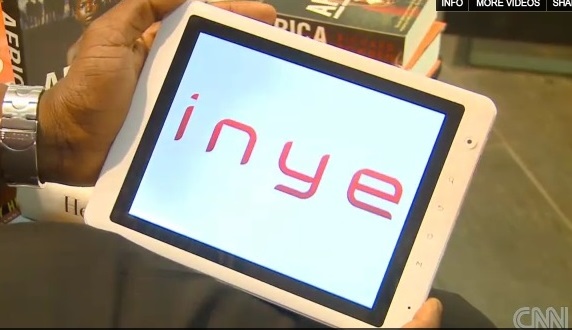(A column highlighting scientific, technological, engineering and design innovation in Africa)
The Inye is a mobile device that allows access to the Internet, with media features that include viewing files and watching movies. It was developed by 29-year-old Nigerian Saheed Abepoju, co-founder with Anibe Agamah of Encipher Ltd., a Nigerian-based technology company.
Friends since high school, Abepoju and Agamah wanted to create an affordable mobile device that would be Africa’s answer to the Apple iPad
The Inye, which means “one” in the Igala language of Nigeria, runs on Android operating systems.
The tablet is priced at about US$350, half the cost of an iPad, which retails at around $700. Abepoju says price is Inye’s strongest selling point.
“What we have is an 8-inch device, a device that is half-way between a laptop and a mobile phone,” he said in an interview with the BBC’s “African Dream” series.
The Inye comes in two specs with pre-installed standard software. Unveiled in April 2010, INYE-1 is a 7-inch resistive screen tablet that runs Android 2.1 and offers about three hours of battery life. Users connect to the Internet using the tablet’s built-in Wi-Fi card. Users can also use an external 3G modem from GSM networks, and can plug in USB devices, such as external flash drives, keyboards and mouse. INYE-1 also allows HDMI output to HDMI-capable devices, such as television.
INYE-2, which was unveiled in May 2011, is an 8-inch capacitive screen tablet that runs Android 2.2 and allows users to connect to the Internet via its built-in Wi-Fi and SIM cards. INYE-2 offers about eight hours of battery life and connection to USB devices.
Abepoju and Agamah contend that the open nature of the Android OS allows third-party developers to build relevant applications for vertical markets, which are still relatively untapped. They currently are collaborating with local developers to add to the Inye’s features, which will include applications to raise awareness to HIV/AIDS, as well as apps related to sanitation and water issues.
Abepoju received his first degree in mathematics and computer science from Federal University of Technology in Nigeria, and completed a post-graduate degree course in advanced computer research at Bournemouth University in Britain. Agamah graduated from the University of Abuja, Nigeria, with a degree in computer science and a post-graduate degree in technology management from the University of East London, Britain.
While Agamah remained in London, Abepoju returned to Nigeria and took a job at a consulting firm, but was fired within eight months “primarily because of differences in approach to doing business,” he told the BBC.
Apple’s launch of the iPad in January of 2010 “inspired us to actually build such [a] product within the African marketplace,” Abepoju said. He borrowed a total of $60,000 from family and friends to do just that.
The first 100 units were built in China. Positive feedback from users and popular demand led to the launch of INYE-2 in 2011. There are plans to expand beyond Africa.













